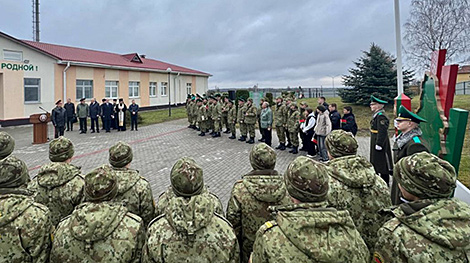Opinions & Interviews
Neverovsky: Belarus' Western neighbors continue policy of escalation, militarization

GRODNO, 4 November (BelTA) - Belarus' neighbors are continuing their policy of escalation and militarization, Deputy State Secretary of Belarus’ Security Council Aleksandr Neverovsky told the media during a ceremony to reopen the renovated Kreivantsy border outpost in Oshmyany District near the Belarusian-Lithuanian border, BelTA has learned.
“Today we reopened the renovated border outpost, and this is part of the strategy of the border service. Creating favorable, comfortable conditions for service contributes to the protection of the state border. In general, we are currently at the Lithuanian-Belarusian section, which has been in the spotlight lately due to restrictions on movement across the border imposed by the Republic of Lithuania. Our neighbors are continuing their policy of escalation and militarization, spending enormous funds (under the pretext of some alleged threat from us) on the purchase of weapons (sometimes even to the detriment of their own population),” Aleksandr Neverovsky said.
He pointed out that, for example, Estonia is the second country in Europe (after Poland) to purchase weapons from the Republic of Korea. Latvia recently signed a contract with Germany's Rheinmetall to build a plant on its territory to manufacture 115-caliber ammunition. Lithuania has decided to host a unit of the German army's 45th Tank Brigade near the Belarusian border.
“Just last month, four major military exercises were held on the territory of the Baltic states. Some of them took place directly near our borders,” Aleksandr Neverovsky said noting that the joint Belarus-Russia exercise was intentionally moved inland to demonstrate its defensive nature.
He stated that an analysis of the ongoing events and the scenarios being practiced during the exercises in the Baltic countries shows that them being defensive is a highly questionable premise. “Today we see that the exercises are focused on practicing rapid deployment of NATO armed forces to our borders. We see that Baltic ports (in Lithuania, Poland) are being modernized, bridges are being repaired to allow the passage of heavy hardware, and new roads and new military airfields are being repaired and built. All of this, combined with the intelligence activities, which are only intensifying against our country with the use of both aviation and unmanned aerial vehicles and also stationary and mobile technical intelligence points along our border, indicates that these intentions are rather not defensive,” Aleksandr Neverovsky noted.
“Furthermore, the frontiers areas (Lithuania has a program called the Baltic Defense Line and the Poles have the Eastern Shield), are being equipped with engineering structures. The population is being relocated, and a strict counterintelligence regime has been established. This raises the question as to whether cigarette smuggling into the Lithuanian border region is even possible. Our border guards, when detaining smugglers and their means of transport on our territory, always find SIM cards from Lithuanian operators in these vehicles. This indicates one thing: such things do not happen without the assistance of officials from the adjacent territory," Aleksandr Neverovsky stated adding that before 2020, close cooperation had been established and such illegal activities were suppressed by joint efforts. ‘Today, we are calling for similar actions. But, so far, we have not heard any response from our neighbors,” he said.
Speaking about the steps being taken by the Belarusian side in response to the current situation, Aleksandr Neverovsky noted: “The head of state has repeatedly spoken about these steps. Of course, to maintain peace in our country, we must prepare every day to defend it. The steps such as deploying systems like Russia’s Oreshnik and tactical nuclear weapons do not mean that we are preparing to attack or launch an assault on neighboring countries. This is, first and foremost, a deterrent, our response, because we need to preserve peace on our land. We are not prepared to spend the same vast amounts on armaments as our neighbors and the collective West, the NATO member countries, but such steps, in our view, are an effective deterrent under current conditions.”







 print version
print version make home page
make home page add to bookmarks
add to bookmarks

